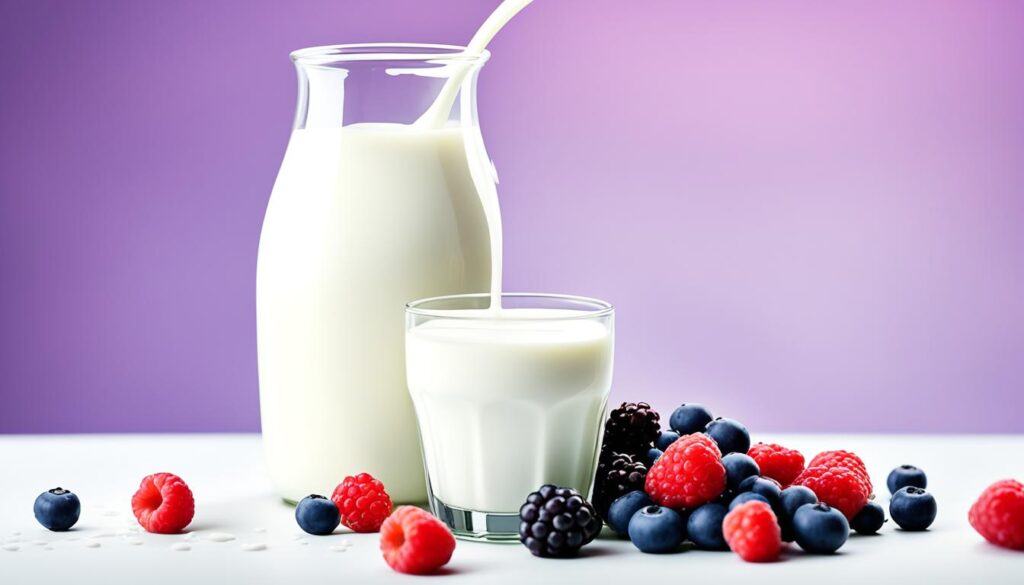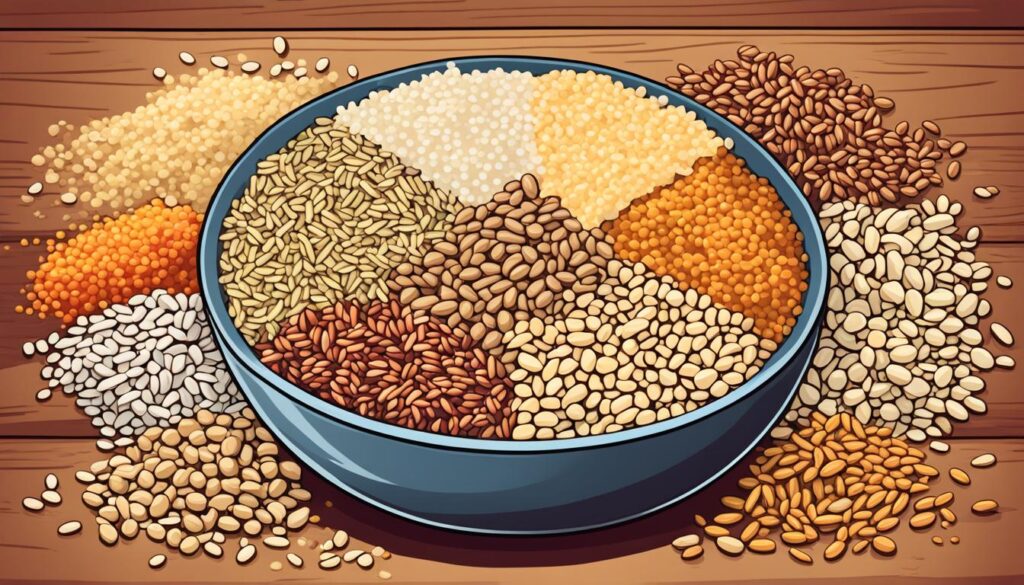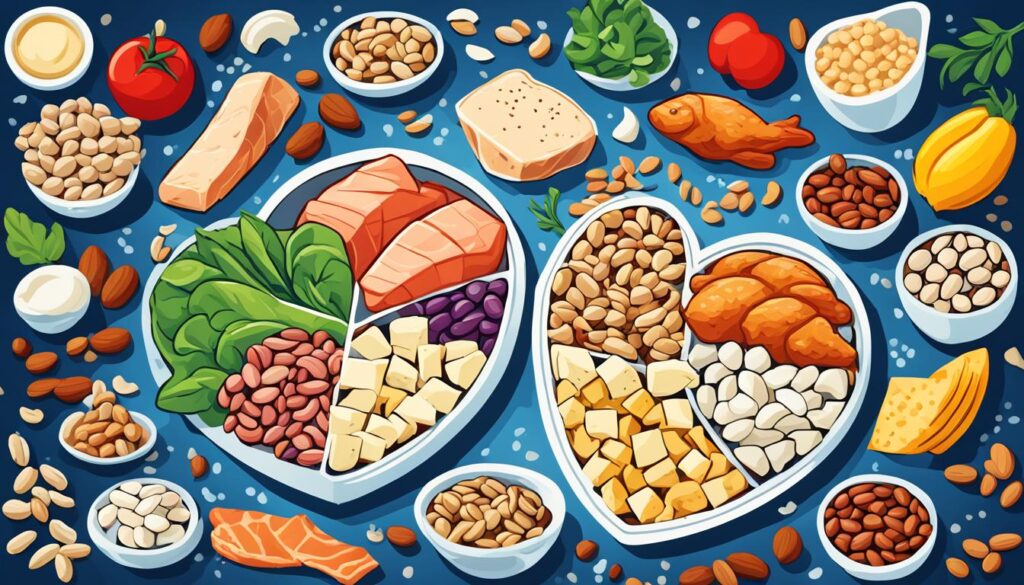Did you know that heart disease is the leading cause of death worldwide, accounting for approximately 17.9 million deaths each year? The good news is that adopting a heart-healthy diet can significantly reduce your risk of developing heart disease and support overall cardiovascular wellness.
When it comes to protecting your heart, what you eat matters. By incorporating the right foods into your diet, you can nourish your heart, maintain healthy blood pressure levels, reduce inflammation, and promote optimal cholesterol levels. Let’s explore the best foods for heart health and how they can benefit your well-being.
Key Takeaways:
- Heart disease is the leading cause of death globally, but adopting a heart-healthy diet can significantly reduce your risk.
- Incorporating the right foods into your diet can nourish your heart and support optimal cardiovascular health.
- Stay tuned to discover the top foods for heart health and their benefits.
Incorporate Vegetables and Fruits
Vegetables and fruits are essential components of a heart-healthy diet. They are rich in vitamins, minerals, antioxidants, and fiber, all of which contribute to maintaining a healthy heart. By incorporating a variety of vegetables and fruits into your meals, you can ensure that you are providing your body with the necessary nutrients it needs to support heart health.
Here are some heart-healthy options to include in your meals:
- Berries: Blueberries, strawberries, raspberries, and blackberries are packed with antioxidants and fiber, making them excellent choices for heart health. Add them to your cereal, yogurt, or smoothies for a delicious and nutritious boost.
- Leafy greens: Spinach, kale, and Swiss chard are all great choices when it comes to vegetables for heart health. They are low in calories and high in vitamins A, C, and K, as well as folate and potassium.
- Cruciferous vegetables: Broccoli, cauliflower, Brussels sprouts, and cabbage are rich in antioxidants, fiber, and vitamins. Incorporate these vegetables into stir-fries, salads, or roasted side dishes.
Remember, variety is key when it comes to incorporating vegetables and fruits into your diet. Try to include different colors and types of produce to ensure you are getting a wide range of nutrients that support heart health.
Heart-Healthy Recipes
Here are a few heart-healthy recipes that include an abundance of vegetables and fruits:
| Recipe | Description |
|---|---|
| Spinach and Berry Salad | This refreshing salad combines baby spinach, mixed berries, and a tangy vinaigrette for a delicious and nutritious meal. |
| Roasted Vegetable Medley | Roasted vegetables, such as broccoli, cauliflower, and bell peppers, are tossed with herbs and olive oil for a flavorful and heart-healthy side dish. |
| Fruit Smoothie Bowl | This colorful and satisfying smoothie bowl is made with a blend of frozen fruits, yogurt, and toppings like granola and sliced bananas. |
Incorporating a variety of vegetables and fruits into your diet is a simple and effective way to support heart health. Whether you enjoy them raw, steamed, roasted, or blended into smoothies, these heart-healthy foods provide the nutrients your body needs to thrive. So, make it a habit to fill your plate with colorful and nutritious produce and try out some heart-healthy recipes to add excitement to your meals.
Include Dairy in Moderation
Dairy products can be part of a heart-healthy diet when consumed in moderation. Opt for low-fat or fat-free options such as:
Low-Fat Milk and Yogurt
Choose low-fat milk and yogurt to fulfill your dairy requirements. These options provide essential nutrients like calcium and vitamin D without the excessive saturated fat content found in whole dairy products.
Reduced-Fat Cheese
When it comes to cheese, opt for reduced-fat varieties. These options still offer the creamy and savory flavors you love, but with less fat and fewer calories. Try reduced-fat versions of cheddar, mozzarella, or feta cheese.
Greek Yogurt
Consider including Greek yogurt in your heart-healthy meal plan. It’s packed with protein and contains less sugar compared to regular yogurt. Add some fresh fruits or a sprinkle of nuts for a delicious and nutritious snack.
| Dairy Products | Description |
|---|---|
| Low-fat milk | Contains essential nutrients like calcium and vitamin D without excessive saturated fat. |
| Low-fat yogurt | Provides probiotics, protein, and essential nutrients. Choose plain or flavored options with less added sugar. |
| Reduced-fat cheese | Offers the same creamy and savory flavors with reduced fat and fewer calories. |
| Greek yogurt | Packed with protein and lower in sugar compared to regular yogurt. Enjoy it with fresh fruits or nuts for added flavor and nutrition. |

Choose Whole Grains
When it comes to maintaining a heart-healthy diet, incorporating whole grains into your meals is essential. Whole grains are packed with essential nutrients, fiber, and antioxidants that promote heart health. Not only do they provide a good source of carbohydrates for energy, but they also help lower the risk of heart disease.
When selecting products, prioritize those that contain “whole wheat” or another whole grain listed as the first ingredient. This ensures that you are truly getting the benefits of whole grains. Be cautious of products labeled as “multi-grain” or “wheat,” as they may not necessarily be whole grains.
Incorporating whole grains into your diet is easier than you might think. Here are some heart-healthy whole grain options to consider:
- Whole wheat bread
- Quinoa
- Oats
- Brown rice
- Barley
These whole grain options can be enjoyed in a variety of heart-healthy recipes. For instance, you can start your day with a bowl of oatmeal topped with fresh fruits and nuts, or whip up a delicious quinoa salad for lunch. (Don’t worry, we’ve got some fantastic heart-healthy recipes coming up in the next section!)
Incorporating whole grains into your meals not only supports heart health but also adds variety and flavor to your diet. So, next time you’re shopping for groceries, reach for those whole grain products and start nourishing your heart.

Include Protein Sources
Protein is an essential nutrient for maintaining overall health and promoting heart health. Including a variety of protein sources in your diet is crucial to ensure you meet your nutritional needs. Here are some heart-healthy foods that are excellent sources of lean proteins:
- Fatty fish: Rich in omega-3 fatty acids, fatty fish like salmon, trout, and mackerel can help reduce inflammation and lower the risk of heart disease.
- Poultry: Skinless chicken and turkey are lean protein options that are low in saturated fat and can be included in a heart-healthy diet.
- Legumes: Beans, lentils, and chickpeas are not only rich in protein but also high in fiber, which helps lower cholesterol levels and improve heart health.
- Nuts and seeds: Almonds, walnuts, flaxseeds, and chia seeds are packed with heart-healthy fats, protein, and other nutrients that support heart health.
- Soy: Foods like tofu, tempeh, and edamame are plant-based sources of protein that are low in saturated fat and can be included in a heart-healthy diet.
Remember to choose lean cuts of meat and poultry, and opt for cooking methods like grilling, baking, or steaming to minimize the intake of unhealthy fats. Including these protein sources in your meals can help you maintain a heart-healthy diet and support your overall well-being.

Expert Tip:
“Incorporating lean proteins into your heart-healthy diet can provide the building blocks for muscle repair, immune function, and overall health. Aim to have a balanced intake of plant-based and animal-based protein sources to enjoy the benefits of both.” – Dr. Jessica Rodriguez, Cardiologist
Conclusion
In conclusion, maintaining a heart-healthy diet is essential for optimal heart health and overall wellness. By incorporating the best foods for heart health mentioned in this article into your daily meals, you can nourish your heart, lower your risk of heart disease, and live your best life.
Remember to choose foods low in saturated fat and sodium, increase your intake of vegetables, fruits, whole grains, lean proteins, and heart-healthy fats like those found in nuts and olive oil. These heart-healthy recipes offer a delicious way to enjoy a nutritious diet.
Embrace a heart-healthy diet and make the necessary changes for a healthier heart and a happier life. With the right food choices, you can take control of your heart health and live your best life!
For more great information on healthy living, check out our articles: Top Foods to Boost Your Immune System Naturally and Boost Your Brain Health with These Top Foods.
FAQ
What are the best foods for heart health?
The best foods for heart health include vegetables, fruits, dairy products in moderation, whole grains, and lean proteins.
Why are vegetables and fruits important for heart health?
Vegetables and fruits are rich in vitamins, minerals, antioxidants, and fiber, which are essential for maintaining a healthy heart.
How can I incorporate vegetables and fruits into my meals?
You can incorporate vegetables and fruits into your meals by adding them to salads, stir-fries, smoothies, and as snacks.
Can I include dairy products in a heart-healthy diet?
Yes, you can include dairy products in moderation as part of a heart-healthy diet. Opt for low-fat or fat-free options such as skim milk, low-fat yogurt, and reduced-fat cheese.
Why are whole grains important for heart health?
Whole grains provide essential nutrients, fiber, and antioxidants that contribute to heart health. They can help lower cholesterol levels and reduce the risk of heart disease.
How can I choose whole grains?
When selecting products, look for those that have “whole wheat” or another whole grain listed as the first ingredient. Consider options such as whole wheat bread, brown rice, quinoa, and oats.
What are some examples of lean protein sources?
Lean protein sources include skinless poultry, fish, legumes (beans, lentils, chickpeas), tofu, and lean cuts of beef or pork.
Why is maintaining a heart-healthy diet important?
Maintaining a heart-healthy diet is important because it can lower the risk of heart disease, promote overall wellness, and support a healthier heart and lifestyle.







One Response